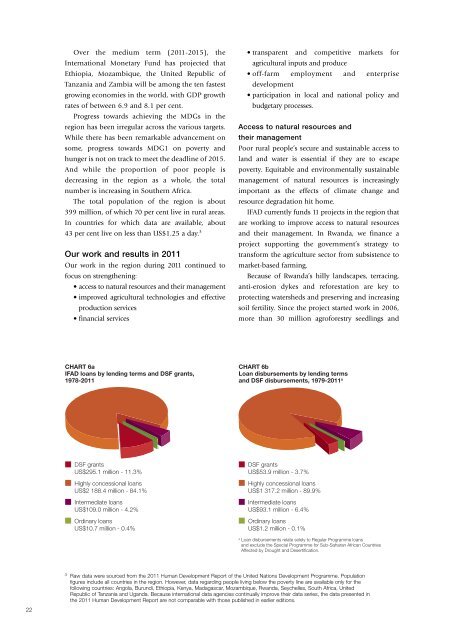ANNUAL REPORT 2011 - IFAD
ANNUAL REPORT 2011 - IFAD
ANNUAL REPORT 2011 - IFAD
Create successful ePaper yourself
Turn your PDF publications into a flip-book with our unique Google optimized e-Paper software.
22<br />
Over the medium term (<strong>2011</strong>-2015), the<br />
International Monetary Fund has projected that<br />
Ethiopia, Mozambique, the United Republic of<br />
Tanzania and Zambia will be among the ten fastest<br />
growing economies in the world, with GDP growth<br />
rates of between 6.9 and 8.1 per cent.<br />
Progress towards achieving the MDGs in the<br />
region has been irregular across the various targets.<br />
While there has been remarkable advancement on<br />
some, progress towards MDG1 on poverty and<br />
hunger is not on track to meet the deadline of 2015.<br />
And while the proportion of poor people is<br />
decreasing in the region as a whole, the total<br />
number is increasing in Southern Africa.<br />
The total population of the region is about<br />
399 million, of which 70 per cent live in rural areas.<br />
In countries for which data are available, about<br />
43 per cent live on less than US$1.25 a day. 3<br />
Our work and results in <strong>2011</strong><br />
Our work in the region during <strong>2011</strong> continued to<br />
focus on strengthening:<br />
• access to natural resources and their management<br />
• improved agricultural technologies and effective<br />
production services<br />
• financial services<br />
CHART 6a<br />
<strong>IFAD</strong> loans by lending terms and DSF grants,<br />
1978-<strong>2011</strong><br />
DSF grants<br />
US$295.1 million - 11.3%<br />
Highly concessional loans<br />
US$2 188.4 million - 84.1%<br />
Intermediate loans<br />
US$109.0 million - 4.2%<br />
Ordinary loans<br />
US$10.7 million - 0.4%<br />
• transparent and competitive markets for<br />
agricultural inputs and produce<br />
• off-farm employment and enterprise<br />
development<br />
• participation in local and national policy and<br />
budgetary processes.<br />
Access to natural resources and<br />
their management<br />
Poor rural people’s secure and sustainable access to<br />
land and water is essential if they are to escape<br />
poverty. Equitable and environmentally sustainable<br />
management of natural resources is increasingly<br />
important as the effects of climate change and<br />
resource degradation hit home.<br />
<strong>IFAD</strong> currently funds 11 projects in the region that<br />
are working to improve access to natural resources<br />
and their management. In Rwanda, we finance a<br />
project supporting the government’s strategy to<br />
transform the agriculture sector from subsistence to<br />
market-based farming.<br />
Because of Rwanda’s hilly landscapes, terracing,<br />
anti-erosion dykes and reforestation are key to<br />
protecting watersheds and preserving and increasing<br />
soil fertility. Since the project started work in 2006,<br />
more than 30 million agroforestry seedlings and<br />
CHART 6b<br />
Loan disbursements by lending terms<br />
and DSF disbursements, 1979-<strong>2011</strong> a<br />
DSF grants<br />
US$53.9 million - 3.7%<br />
Highly concessional loans<br />
US$1 317.2 million - 89.9%<br />
Intermediate loans<br />
US$93.1 million - 6.4%<br />
Ordinary loans<br />
US$1.2 million - 0.1%<br />
a Loan disbursements relate solely to Regular Programme loans<br />
and exclude the Special Programme for Sub-Saharan African Countries<br />
Affected by Drought and Desertification.<br />
3 Raw data were sourced from the <strong>2011</strong> Human Development Report of the United Nations Development Programme. Population<br />
figures include all countries in the region. However, data regarding people living below the poverty line are available only for the<br />
following countries: Angola, Burundi, Ethiopia, Kenya, Madagascar, Mozambique, Rwanda, Seychelles, South Africa, United<br />
Republic of Tanzania and Uganda. Because international data agencies continually improve their data series, the data presented in<br />
the <strong>2011</strong> Human Development Report are not comparable with those published in earlier editions.

















